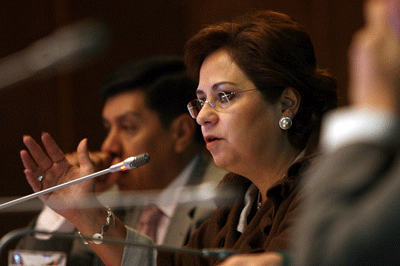NGOs Participate in Forthcoming United Nations Conference on Climate Change
Topic(s)
The Mexican Government and ECLAC gave details of the meeting to be held in Cancún from 29 November to 10 December 2010.

(30 October 2010) The Government of Mexico, which is presiding over the 16th Conference of the Parties of the United Nations Framework Convention on Climate Change (UNFCCC), and the Economic Commission for Latin America and the Caribbean (ECLAC) today informed various civil society organizations about the topics that will be discussed at the forthcoming climate change summit.
The working meeting was attended by the European Union and was held at the ECLAC headquarters in Santiago, Chile. Also in attendance were non-governmental organizations (NGOs) that play an active role in climate change issues within Latin America and the Caribbean.
The aim was to inform NGOs about the status of discussions in the sphere of the Conference and the Kyoto Protocol, and the possible outcomes of the 16th Conference of the Parties, known as COP 16, which will be held Cancún, Mexico, from 29 November to 10 December.
The meeting was opened by Alicia Bárcena, Executive Secretary of ECLAC, and Patricia Espinosa, Mexico's Secretary of Foreign Affairs. The meeting was also attended by the Chilean Undersecretary for Foreign Affairs, Fernando Schmidt; the Consul-General of the Plurinational State of Bolivia in Chile, Walker San Miguel; the Head of the European Commission's Delegation in Chile, Jaime Pérez Vidal; and Horacio Peluffo, representing the UNFCCC secretariat and Christiana Figueres, UNFCCC Executive Secretary.
Alicia Bárcena welcomed the civil society representatives by stating that "the only way of achieving sustainable equality-based development is through the full participation of society, and this requires society to have the best information possible".
The Executive Secretary went on to explain that ECLAC is not taking part in negotiations, but is supporting Latin American and Caribbean countries by providing technical information and studying the economics of climate change in the region, including an estimate of the costs of different international response scenarios to mitigate the effects of climate change.
She stated that an informed society is fundamental for development, and that narrowing the sustainability gaps would require new State-market-society relationships, as advocated in the document Time for equality: closing old gaps, blazing new trails, which the Commission launched at its Thirty-third Session held in June in Brasilia.
The Secretary of Foreign Affairs of Mexico, Patricia Espinosa, highlighted the role of ECLAC in providing analyses that make a significant contribution to public policies in the region, and said the future has a major challenge in store for the region: "the transition towards a low-carbon economy is essential, by changing production and consumption patterns with a long-term vision".
She described the deep transformation process that our societies must undergo, and said that this could not be achieved through one single decision, but rather through a continual process of change that she hoped would be triggered in Cancún.
According to the Secretary of Foreign Affairs, a binding agreement would be an important step in strengthening global action and, as chair of COP16, the Mexican Government has promoted inclusion and transparency with all regional groups and a frequent dialogue with all groups interested in the process.
Walker San Miguel, who presented the results of the World People's Conference on Climate Change and the Rights of Mother Earth, held in Cochabamba in April 2010, said he hoped that majorities would really be listened to in COP 16, and that it would be the beginning of a new phase of caring for the planet.
Jaime Pérez Vidal described the contributions of the European Union to COP16, which confirm its commitment to the multilateral process.
On behalf of civil society, Sara Larrain, Director of the Sustainable Chile Programme, praised the leadership of ECLAC in providing this forum for governments and citizens' organizations.
She stated the following: ‘We share the notion that transparency and citizen inclusion in negotiations can provide positive pressure to speed up multilateral and democratic consensuses, while also maintaining the legitimacy of the international political system of the United Nations".
The meeting was attended by NGO representatives from Argentina, Brazil, Chile, Ecuador, Honduras, Mexico, Nicaragua, Panama, Paraguay, Peru and Uruguay.
Any queries should be addressed to the ECLAC Public Information and Web Services Section.
E-mail: dpisantiago@cepal.org; telephone: (56 2) 210 2040.
Country(ies)
- Latin America and the Caribbean
Contact
Public Information Unit
- prensa@cepal.org
- (56 2) 2210 2040